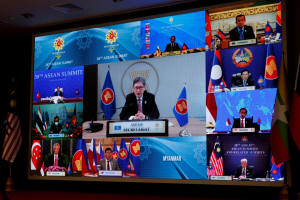Myanmar junta rebuked by SE Asian leaders after ASEAN summit no-show
 Send a link to a friend
Send a link to a friend
 [October 26, 2021]
By Ain Bandial [October 26, 2021]
By Ain Bandial
BANDAR SERI BEGAWAN (Reuters) - Southeast
Asian leaders sharply criticised Myanmar's junta as a regional summit
opened on Tuesday without a representative from the country, following
its top general's exclusion for ignoring a peace roadmap agreed six
months ago.
The Association of Southeast Asian Nations (ASEAN) had said it would
accept a non-political figure from Myanmar, but the junta on Monday
rejected that, saying it would only agree to its leader or a minister
attending.
In an unprecedented snub to the leader of a member state, ASEAN had
decided to sideline junta chief Min Aung Hlaing, who led a Feb. 1 coup
that spiralled into violence and nationwide chaos, for his failure to
cease hostilities, allow humanitarian access and start dialogue with
opponents, as agreed with ASEAN in April.

The decision was a huge insult to Myanmar's military and a rare, bold
step by a regional grouping known for its code of consensus,
non-interference and engagement.
"Today, ASEAN did not expel Myanmar from ASEAN's framework. Myanmar
abandoned its right," said Cambodian Prime Minister Hun Sen, who will
become the group's chairman next year.
"Now we are in the situation of ASEAN minus one. It is not because of
ASEAN, but because of Myanmar."
Indonesian Foreign Minister Retno Marsudi said ASEAN had a slot ready
for Myanmar, but it chose not to join.
Indonesian President Joko Widodo in his remarks to leaders lamented
Myanmar's "unwelcome attitude" towards ASEAN's diplomatic efforts, Retno
said.
"ASEAN's decision to invite a Myanmar representative on a non-political
level was a heavy one, but it had to be done," she said.
"The president reminded that it's important for us to honour the
principles of non-interference. But on the other hand, we're obligated
to uphold other principles ... like democracy, good governance, respect
for human rights, and a constitutional government."
Myanmar's military, which ruled the country for 49 of the past 60 years,
has objected strongly, to ASEAN's uncharacteristically strict response,
accusing it of departing from its norms and of allowing itself to be
influenced by other countries, including the United States.
Thai Prime Minister Prayuth Chan-ocha, a retired general considered the
ASEAN leader closest to Myanmar's coup-makers, urged the country to
implement a five-point roadmap it agreed with ASEAN.
He said the issue was crucial for the bloc's reputation and a test of
its resolve.
CREDIBILITY AT STAKE
"ASEAN's constructive role in addressing this situation is of paramount
importance and our action on this matter shall have a bearing on ASEAN's
credibility in the eyes of the international community," Prayuth said.
[to top of second column]
|

A view shows virtual 38th ASEAN Summit, in Bandar Seri Begawan,
Brunei October 26, 2021. REUTERS/Ain Bandial

ASEAN made the call days after its special envoy
Erywan Yusof said the ruling State Administrative Council (SAC)
denied him sufficient access, including to ousted,
democratically-elected leader Aung San Suu Kyi, who is charged with
multiple crimes.
Prayuth said he was hopeful the junta would trust ASEAN's intentions
and that Erywan could visit Myanmar soon and make an "important
first step in the process of confidence-building".
Myanmar security forces have killed more than 1,000 people and
detained thousands more, many tortured and beaten, according to
United Nations envoys, who say army offensives in civilian areas
have caused massive displacement.
Myanmar has rejected that as biased and exaggerated by unreliable
sources and blames "terrorists" allied with a shadow National Unity
Government (NUG).
U.S. National Security Advisor Jake Sullivan met on Monday with
representatives of the NUG, an alliance of pro-democracy groups,
militias and ethnic minority armies formed after the coup.
ASEAN leaders were due also to collectively meet leaders of the
United States, China and South Korea, while U.S. President Joe Biden
will attend a joint session by video link.
Some analysts predict a lengthy standoff between Myanmar and ASEAN
after a crisis they said has exposed the bloc's weaknesses and its
need to take a different approach.

Thitinan Pongsudhirak, director of the Institute of Security and
International Studies at Bangkok's Chulalongkorn University, said
ASEAN's best chance of success was to engage outside powers and all
sides in Myanmar.
"The non-interference principle no longer holds because Myanmar's
armed forces lowered the standards of acceptable governance so low
that it has alienated and undermined ASEAN in the international
community," Thitinan said.
(Reporting Ain Bandial in Bandar Seri Begawan; Additional reporting
by Tom Allard in Sydney, Stanley Widianto in Jakarta; A.
Ananthalakshmi in Kuala Lumpur, Panu Wongcha-um in Bangkok; Writing
by Martin Petty; Editing by Simon Cameron-Moore)
[© 2021 Thomson Reuters. All rights
reserved.] Copyright 2021 Reuters. All rights reserved. This material may not be published,
broadcast, rewritten or redistributed.
Thompson Reuters is solely responsible for this content. |